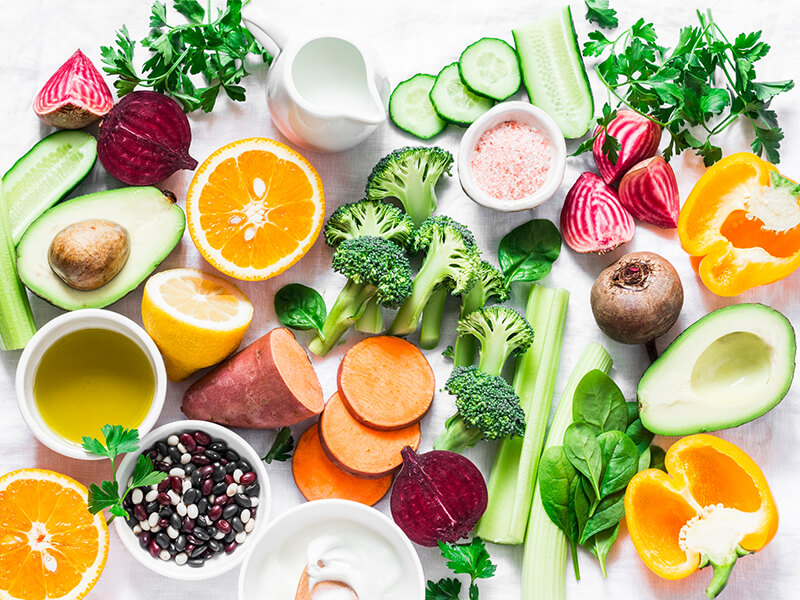
Introduction
Hormonal imbalance can impact various aspects of health, including metabolism, mood, energy levels, and reproductive health. One of the easiest and most effective ways to support hormone regulation is by incorporating the right fruits and vegetables into your diet. These nutrient-dense foods contain essential vitamins, antioxidants, and fiber that help stabilize hormone levels naturally. In this article, we explore the best fruits and vegetables to eat for hormonal balance and how they contribute to overall well-being.
Best Fruits for Hormonal Balance
1. Berries
Berries are packed with antioxidants that help reduce inflammation and support hormone function.
- Blueberries: Aid in insulin regulation and reduce oxidative stress.
- Strawberries: Support estrogen balance and skin health.
- Raspberries: High in fiber, promoting gut health and detoxification.
2. Avocados
Avocados are rich in healthy fats that play a crucial role in hormone production.
- Monounsaturated fats in avocados support adrenal health and reduce cortisol levels.
- High in vitamin E, which is essential for reproductive health.
3. Bananas
Bananas help in balancing mood-related hormones due to their high levels of vitamin B6.
- Support serotonin production, reducing stress and anxiety.
- Provide a steady release of energy, helping to stabilize blood sugar levels.
4. Pomegranates
Pomegranates are known for their estrogen-regulating properties.
- Contain natural compounds that help prevent estrogen dominance.
- Support heart health and reduce inflammation.
5. Citrus Fruits
Oranges, lemons, and grapefruits provide essential vitamins for hormone balance.
- Vitamin C supports adrenal gland function and reduces stress hormones.
- Help detoxify excess estrogen in the liver.
6. Apples
Apples are rich in fiber and antioxidants, helping to remove excess hormones from the body.
- Contain quercetin, which has anti-inflammatory and hormone-regulating properties.
- Promote gut health, which is crucial for hormone metabolism.
7. Papaya
Papaya contains enzymes that support digestion and hormone production.
- High in vitamin A and C, promoting reproductive health.
- Helps reduce PMS symptoms and menstrual irregularities.
8. Cherries
Cherries are an excellent source of melatonin, which aids in sleep and hormone regulation.
- Improve sleep quality, which is essential for hormone balance.
- Contain anti-inflammatory properties that support adrenal health.
Best Vegetables for Hormonal Balance
1. Cruciferous Vegetables
These vegetables aid in detoxifying excess hormones and support liver function.
- Broccoli
- Cauliflower
- Brussels Sprouts
- Kale
2. Leafy Greens
Leafy greens provide essential nutrients for hormone health and overall well-being.
- Spinach: High in magnesium, which reduces stress and supports adrenal function.
- Swiss Chard: Helps regulate blood sugar levels and insulin response.
- Collard Greens: Rich in fiber, promoting gut health and detoxification.
3. Sweet Potatoes
Sweet potatoes contain complex carbohydrates that support balanced blood sugar and hormone levels.
- Rich in beta-carotene, which supports reproductive health.
- Aid in reducing symptoms of estrogen dominance.
4. Bell Peppers
Bell peppers are high in vitamin C and antioxidants, which help manage stress hormones and inflammation.
- Support adrenal function and cortisol regulation.
- Boost immune health, benefiting overall hormone balance.
5. Carrots
Carrots help the body eliminate excess estrogen and support overall hormone metabolism.
- Rich in fiber, aiding digestion and hormone detoxification.
- Support skin health and menstrual cycle regulation.
How to Incorporate These Fruits and Vegetables into Your Diet
- Smoothies: Blend berries, bananas, and spinach for a nutrient-packed drink.
- Salads: Add leafy greens, bell peppers, and pomegranate seeds for a balanced meal.
- Snacking: Enjoy fresh cherries, papaya slices, or raw carrot sticks as a healthy snack.
- Juicing: Prepare fresh citrus and vegetable juices to detoxify and energize your body.
- Cooking: Roast sweet potatoes and cruciferous vegetables for a hormone-friendly dish.
Conclusion
Eating the right fruits and vegetables can significantly improve hormonal balance and overall health. By including berries, avocados, bananas, pomegranates, citrus fruits, apples, papaya, and cherries along with cruciferous vegetables, leafy greens, sweet potatoes, bell peppers, and carrots in your diet, you can naturally support hormone function. Pairing a nutrient-rich diet with a healthy lifestyle, stress management, and regular exercise will further enhance hormonal well-being. If symptoms persist, consult a healthcare provider for personalized advice.

